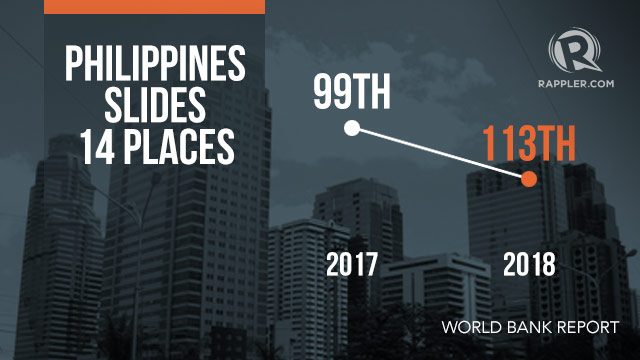SUMMARY
This is AI generated summarization, which may have errors. For context, always refer to the full article.

MANILA, Philippines – Despite continued reforms in electricity service and tax payment schemes, small- and medium-sized enterprises found it more difficult to do business in the Philippines relative to the rest of the Asia-Pacific Economic Cooperation (APEC) member economies.
The Philippines has slipped 14 notches from 99th to 113th place among 190 economies in the 2018 World Bank-International Finance Corporation Doing Business Report released Tuesday night, October 30.
While its distance-to-frontier (DTF) score has improved, the Philippines fell behind all of its 20 APEC neighbors. The country’s score of 58.74 is even below the regional average of 74.69.
The DTF measure shows the distance of each economy to the “frontier”, which represents the best performance observed on each of the indicators across all economies in the Doing Business sample since 2005.
An economy’s DTF score is reflected on a scale from 0 to 100, where 0 represents the lowest performance and 100 represents the frontier, the 2018 World Bank report read.
The Philippines has showed slight progress in most indicators, but its neighbors have made bigger improvements than the country, the report said. (READ: Infrastructure remains weak link in Philippines’ competitiveness)
In the ease of doing business indicators, the Philippines improved the most in getting electricity (from 83.77 score to 84.31 DTF score), and paying taxes (from 65.80 to 69.27).

Pace of reforms slower
The World Bank said its survey showed that the Philippines reduced the time to get an electricity connection by implementing a new asset management system and by creating a new scheduling and planning office.
The country has also made paying taxes easier by introducing a new electronic system for payment and collection of the housing development fund contributions, the report read.
However, the World Bank said the pace of reforms in the Philippines is slower compared to many other countries, including several regional neighbors.
Despite the reforms, the World Bank said that companies here still face significant regulatory challenges, leaving room for further improvements, especially in the areas of starting a business (from 68.86 to a score of 68.88), enforcing contracts (45.96 score unchanged at 45.96), and protecting minority investors (score unchanged at 40).
The report showed that incorporating a business in Quezon City requires 16 procedures, takes 28 days, and costs around 16% of income per capita.
This is compared to Canada’s two procedures, 1.5 days and, less than 1% of income per capita needed to incorporate a business in Toronto.
New Zealand (1st) and Singapore (2nd) continue to be the role models for ease of doing business in the world and in the APEC region, scoring 86.55 and 84.57, respectively. – Rappler.com
Add a comment
How does this make you feel?





There are no comments yet. Add your comment to start the conversation.